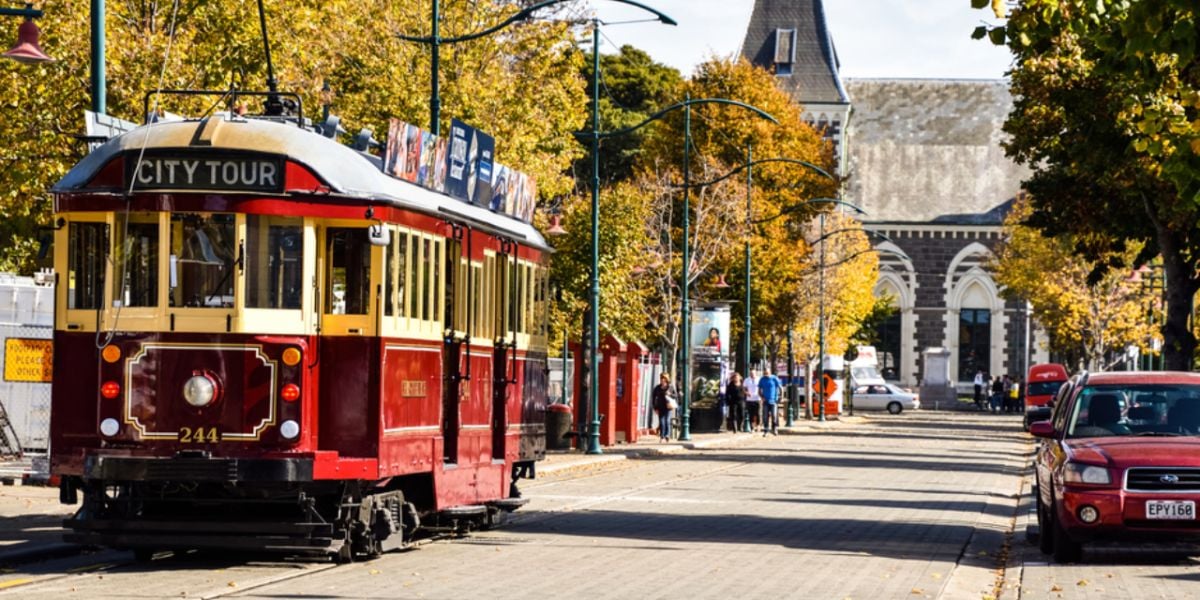
If you are looking to study in a unique location, close to natural beauty and boasting world-class universities, then Christchurch, New Zealand, is worth your consideration. Here is everything you need to know as an international student in Christchurch.
Christchurch overview
The largest city on New Zealand's South Island is highly ranked in terms of its educational offerings. Coming in at 85th on the QS Best Student Cities Index and boasting two universities in the world's top 400, Christchurch is a great place to study. Often referred to as 'The Garden City', it is located about halfway down the island's East Coast and offers a dry, temperate climate most of the year.
Close to both the Southern Alps and the Pacific Ocean, it offers plenty of opportunities for adventure. Surfing, kayaking, mountaineering, tramping, and rock climbing are all within easy reach. The city itself is known for being home to the most English expats in New Zealand, and this heritage is seen throughout the city's architecture, gardens, and its own River Avon, so if you hail from the UK or have Anglophile leanings, then you should feel right at home. While it experienced earthquake devastation back in 2011, Christchurch was rebuilt and has prospered over the years since, gaining many interesting new landmarks and a renewed community spirit.
The teaching culture in New Zealand
New Zealand higher education takes a very practical, hands-on approach to learning and tends to offer a more flexible course structure than many other Western countries. Faculty members tend to be very laid-back and approachable, giving students ample opportunity to connect with their professors and get the guidance and assistance they need.
There are five types of higher education institutions in New Zealand: Universities, polytechnics, colleges, wānangas (teaching mainly in Māori), and private tertiary providers. Most international students will attend a university – there are eight in the country. A university undergraduate degree program typically takes three years to complete in New Zealand as there are limited general education course requirements, although some intensive subjects require a four-year commitment. Master's degrees take one or two years, depending on whether or not they are researched-based. A doctoral degree takes approximately three years to finish. An example of New Zealand's grading scale can be seen on the University of Canterbury website.
Universities in Christchurch
University of Canterbury
In 1873, Canterbury College, as it was first known, became the second university in New Zealand. It was founded by Oxford and Cambridge scholars and, therefore, based on the Oxbridge model of education with the major difference that women have always been able to attend. Two of its graduates contributed so much to the country that they are featured on New Zealand banknotes: Lord Ernest Rutherford on the NZ$100 note and Sir Apirana Ngata on the NZ$50 note.
Originally based in stately stone buildings in the city center of Christchurch, the newly independent and renamed University of Canterbury moved to an extensive purpose-built campus in the suburb of Ilam in 1975. It now consists of the five colleges of Arts; Education, Health and Human Development, Engineering, Science, and Building and Law. In 2023, the international ranking agency QS ranked the University of Canterbury number 284 in the World University Rankings. The university offers over 70 degree courses, a large number of which rank in the top 100 to 300 in the world. Up-to-date rankings of its programs can be seen here.
Canterbury's most prestigious degree programs are civil and structural engineering, and it consistently scores well in teacher education and other education-studies-based programs. English, law, sociology, geography, and finance courses are all well-respected programs at the University of Canterbury,
Most secondary school qualifications that satisfy undergraduate university program conditions in your home country will also meet the University of Canterbury's admission specifications, but it is worth double-checking course entry requirements. If you do not meet them in the first instance, they do offer foundation programs to get you up to their standards. You may also need to satisfy the English language prerequisites before being admitted. Postgraduate courses, including master's and doctoral degrees, require a valid undergraduate degree and other application materials depending on the course of your choice. The university's website has guides for both graduate and Ph.D. program applications.
Lincoln University
New Zealand's third oldest university is Lincoln, which was originally founded in 1878 as the School of Agriculture within the University of Canterbury. It became the separate Canterbury Agricultural College in 1896 thanks to the huge growth in the agriculture industry, which resulted in the need for a dedicated agricultural school. As of 1990, it is the fully independent Lincoln University as it is known today.
Located just 9 miles outside Christchurch city center, Lincoln University is considered a small school with approximately 3,500 full-time students from over 60 countries. The small class size and its focus on hands-on learning give a very personalized education that has consistently led to a high employment rate for graduates. Lincoln is a 5-star rated university. It falls in the world's top 600 universities in the Times Higher Education world rankings. Known for its Agriculture and Forestry program, it is also highly rated for Hospitality and Leisure Management.
To gain admission to Lincoln as an international undergraduate student, you will need to pass an English language test and have the appropriate secondary school graduation qualifications. These differ according to your home country's schooling system, so check the university's website for details. For graduate and postgraduate studies, you will need the appropriate prerequisite degrees, transcripts, academic CV, references, and possibly other supplementary materials, such as a thesis abstract, depending on your intended program. All postgraduate admission details can be found here.
For further information about attending Lincoln as an international student, see the university's International Students section of its website.
Jobs and internships in Christchurch
If your program of study consists of 120 or more points, you should be able to work 20 hours per week on a student visa during the semester and 40 hours per week during holidays. Double-check your specific visa requirements, as working conditions may vary depending on your situation. Any potential employers should also do the relevant checks for you before confirming employment. Unfortunately, self-employment is not allowed on any student visa. Once you have your degree, you may be able to convert your student visa to a more general New Zealand work visa. To see if this might apply to your circumstances, consult the NZ Immigration website.
If you do secure employment, you will most likely need to open a New Zealand bank account and secure an IRD number to pay the proper taxes. Internships are also offered during many degree courses. Placements typically get arranged by the university and require additional tuition fees when resulting in course credit.
Fees, scholarship and financial aid in Christchurch
University of Canterbury
Fees for international students differ depending on your degree level and course type. The fees for Bachelor's degrees range from NZ$30,000-$42,000 for the 2023 academic year, and for master's, they are estimated at NZ$34,600-$63,400. International students wanting to complete a Ph.D. are now able to do so at the same rate as domestic students, thanks to a new government scheme, provided they do not leave New Zealand for more than 365 days during their study.
New Zealand universities charge an additional Student Services Levy (SSL) on top of tuition costs. This is money that goes towards student needs only, and an annual survey determines how it is spent. It helps fund things like health services, recreation centers, disability resources, and student events. The SSL is calculated based on how many points you are studying, with an average full-time course adding up to an SSL of NZ$900.
The university awards over NZ$20 million worth of scholarships every year, so it is worth seeing whether you qualify. Financial aid isn't often available from the New Zealand government to international students, but your home country may provide you with loans to study abroad.
Lincoln University
Fees for international students vary depending on your course of study, but a breakdown of fees for specific courses can be found here. A student services fee also applies at approximately NZ$440 per semester.
Lincoln offers a range of scholarships for international students. You can apply for multiple scholarships as long as you meet the eligibility criteria. Depending on your home country, you may also be able to acquire a student loan.
Student accommodation in Christchurch
University of Canterbury
The University of Canterbury is very accommodating for international students, as they recognize that you will need a home away from home during your studies. There are multiple fully-catered residence hall options available, as well as 2-6 bedroom self-catering apartments. For graduate and postgraduate students, there are independent university apartments on offer, or you may prefer to find private housing nearby. If you apply for a place as an international student before December 1st, you are guaranteed a spot. Any international students under the age of 18 must live in a homestay, under an appointed caregiver, or in fully-catered halls.
University-affiliated housing is all within walking distance of the campus, as well as many recreational facilities. Weekly first-year hall rates start at NZ$370 and go up to NZ$553. Flatting costs between NZ$180-NZ$250 per week but can be more or less depending on how many people share your house. The University of Canterbury provides a full housing guide with all details.
Lincoln University
Lincoln has both fully-catered residence halls and self-catered flatshares on campus. In general, first-year students live in the halls, while older students rent apartment-style accommodation. Fully-catered units cost NZ$13,000-NZ$17,000 for the school year, while semi-catered and self-catered options are cheaper. Homestays are another option, as well as private renting around Christchurch for a more independent lifestyle.
You must apply in advance for a place in student housing. While you may specify your preferences, you will be assigned either a hall or self-catered residence by the university. A full housing guide can be found on Lincoln's website.
The cost of living in Christchurch
Christchurch has the third-highest cost of living in New Zealand, after Auckland and Wellington, and is relatively middle-of-the-road when compared to the rest of the world. New Zealand prices for food and clothing tend to be on the expensive side, often because things must be imported into the country. A dozen eggs cost NZ$8-NZ$12.00, a loaf of bread is NZ$2.50-NZ$5.00, and a small bottle of Coca-Cola is around NZ$4.00. A pair of brand-name jeans tends to set you back NZ$100-$150. However, the minimum wage is NZ$21.20 per hour, so it does often even out.
For cheaper food and clothing, you can shop at stores like Pak 'N' Save and The Warehouse. 'Op Shops' are the New Zealand equivalent of charity shops or thrift stores and good places to find cheaper, gently used items for students on a tight budget.
Housing will be the most significant part of your budget, and costs will vary depending on whether you live in campus residences, a homestay, or decide to lease a private rental. Other additional costs may include a mobile phone, internet, transport, and entertainment. The University of Canterbury has an estimated cost of living guide on its website to assist you.
Your New Zealand student visa will likely require you to prove that you have at least NZ$15,000 per year to financially support yourself while in the country. Various universities recommend that you have anywhere between NZ$15,000 to NZ$27,000 to cover annual costs. If your visa allows it, you can typically work up to 20 hours per week.
Student life in Christchurch
Leisure
New Zealand's South Island is a hub of beauty and adventure, and Christchurch is arguably at the center of all of it. If you are the outdoorsy type, a base in Christchurch allows for weekend trips to many of the country's highlights: Queenstown and its adrenaline-packed activities, Franz Josef and Fox Glaciers on the West Coast, Mt. Cook and the nearby turquoise lakes of Tekapo and Pukaki, and Milford and Doubtful Sounds. It isn't very difficult to go as far as Invercargill and Stewart Island for some Kiwi spotting or up to the Marlborough Sounds (Picton) for the ferry over to the North Island. Kaikoura, renowned for its marine mammal viewings and the quintessential French settlement Akaroa, are both near Christchurch.
Christchurch is full of shopping opportunities, cinemas, and nightlife to keep you entertained. It also hosts national professional sporting events while having plenty of community teams for you to join if you are into sports. The Canterbury Museum and its Quake City exhibit, as well as the Air Force Museum, are notable places to go for an educational outing. Christchurch isn't known as 'The Garden City' for nothing; the Botanic Gardens, Frensham Gardens, and Mona Vale are all blooming marvelous.
Eating out
New Zealand is known for its food culture, and Christchurch is not one to disappoint. That, paired with a passion for local businesses, means there are many unique restaurants that have something for everyone.
Cook 'n' With Gas serves delectable New Zealand cuisine in a uniquely designed 1860s villa. It is also home to the accompanying Astro Lounge, where you can eat and drink more casually and sometimes catch a movie screening or outdoor barbecue. If you are keen on brunch, then Hello Sunday Café, housed in an 18th-century post office that also served as a Baptist Church Sunday School in its past life, is a must. Speaking of post offices, another one had new life breathed into it when it became C1 Espresso, a coffee shop that uses a pneumatic tube system to deliver some menu items to your table and serves New Zealand's traditional lamingtons with a syringe of filling you can inject yourself.
Christchurch sits between many of New Zealand's finest wine regions and vineyards, so there is no shortage of good tipple and places to taste it. The Waipara Valley is the closest place to venture for proper cellar door visits, just 45 minutes drive north. Many central Christchurch restaurants provide local wines.
Visa, enrollment, and other useful information for international students in New Zealand
If you plan to move to New Zealand as an international student, then you will require a student visa for the duration of your studies. You will be asked to provide all valid visa documentation to your school before they confirm enrollment, and failing to demonstrate this may result in your place being revoked. Visas can be complicated, so most universities will help you with your application and give full guidance. You can find all student visa information on the Immigration New Zealand Website. The type of visa you need will depend on your nationality, age, financing, and length of study.
The New Zealand academic year typically begins in late February/early March and goes until November, breaking for winter holidays in July. December and January serve as either summer holidays or the summer term if you prefer to take classes year-round. Check the details of all the programs offered carefully, as admission requirements and deadlines can vary. It is also wise to apply in advance so you have time to organize your visa and international travel.
We do our best to provide accurate and up to date information. However, if you have noticed any inaccuracies in this article, please let us know in the comments section below.








